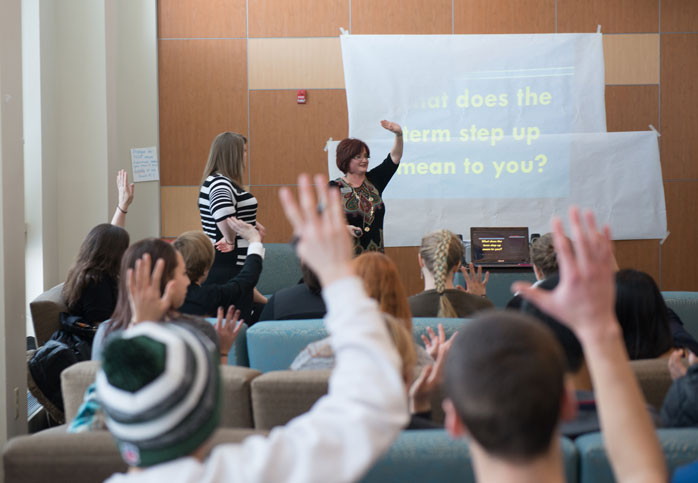Bystander intervention training helps community members Step UP!
 Twenty-five New Paltz High School (NPHS) students and two teachers came to SUNY New Paltz this month for a training session designed to develop skills for confronting and curbing hurtful behavior in and out of the classroom.
Twenty-five New Paltz High School (NPHS) students and two teachers came to SUNY New Paltz this month for a training session designed to develop skills for confronting and curbing hurtful behavior in and out of the classroom.
The event was part of the Center for Student Development’s ongoing efforts through the Step UP! Bystander Intervention Program to motivate community leaders, teachers and youths to take a proactive role in helping others.
Step UP! is a national initiative developed at the University of Arizona to help counter a psychological phenomenon commonly known as “the bystander effect,” in which the presence of others hinders an individual from offering help to a victim in an emergency situation.
“Bystander intervention is a life-long skill-building program,” said Michelle Combs, director of student development. “The training helps people become more aware of why they sometimes don’t help, and makes them more likely to help in the future.”
Combs and Head Women’s Soccer Coach Colleen Bruley were the first College staff membersto receive training in the Step UP! program in 2012. They have since shared bystander intervention education with more than 400 students and 100 professional staff at the College, including student orientation leaders, athletes and residence hall staff, and plan to further extend training to the broader New Paltz community of youths and educators, including NPHS and the New Paltz Youth Program.
Bystander intervention can be effective as a remedy for immediate emergencies such as instances of physical or sexual violence, as well as more subtle problems including eating disorders, drug and alcohol abuse, bullying and intimidation, depression and anxiety. Many of these issues are especially relevant to teenagers and young adults, and so offering bystander intervention education to high school and college students can have a significant impact.
The Greater New Paltz Community Partnership (GNPCP), a coalition of regional organizations, businesses and individuals formed to reduce substance abuse among local youths, has helped build relationships between the College and the educators and youth groups that stand to benefit from the Step UP! training.
Steph Piña ’15 (Spanish), project assistant for the GNPCP, said “the training can be valuable to college and high school students equally. It’s especially important for students in leadership positions to understand these skills, to know not just how but when to stand up — when it’s safe and not safe.”
More information is available at the websites of the Center for Student Development, the Step UP! program, and the Greater New Paltz Community Partnership.
